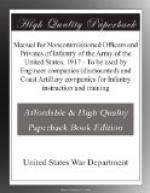At assembly for the march the men fall in in rear or the stacks fully equipped for marching.
SECTION 2. MARCHING.
The principal work of troops in the field consists of marching. Battles take place only at indefinite intervals, but marches are of daily occurrence. It is only by good marching that troops can arrive at a given point at a given time and in good condition for battle.
The rate of march depends greatly upon the condition of the roads and the weather, but the average rate for infantry is about 2-1/2 miles per hour. This allows for a rest of 10 minutes each hour. The total distance marched in a day depends not only on the rate of march, but upon the size of the command, large commands often covering only about 10 miles a day, while small commands easily cover double that distance.
In order to make the march with the greatest comfort and the least danger, it is necessary that each unit be kept well in hand. Each man is permitted and encouraged to make himself as comfortable as possible at all times, excepting only that he must not interfere with the comfort of others or with the march of the column.
Infantry generally marches in column of squads, but on narrow roads or trails column of twos or files is used. The route step is habitually used when silence is not required. In large commands, in order that the column be kept in hand, it is very necessary that each man keep his place in ranks and follow his file leader at the prescribed distance. This is one of the best tests for determining the discipline and efficiency of troops. The equipment should be carefully adjusted before starting out, and any part that is not comfortable should be rearranged at the first opportunity. The rifle is carried at will, except that the muzzle must be pointed up so as not to interfere with the other men.
Under no circumstances will any man leave the ranks without permission from his company or higher commander. If the absence is to be for more than a short while, he must be given a pass showing his name, rank, and organization, and the reason he is permitted to be absent. If sick, it is better to wait by the roadside at some comfortable place for the arrival of the surgeon or the ambulance. In any case, the soldier keeps his rifle and equipment with him, if possible. Soldiers absent from their organization without a pass will be arrested and returned to their command for punishment.
Marches in hot weather are particularly trying. Green leaves or a damp cloth carried in the hat lessens the chance of sunstroke. The hat should have ventilators, and when not exposed to the direct rays of the sun it should be removed from the head. It is well to keep the clothing about the neck and throat open, and sometimes to turn up the shirt sleeves so as to leave the wrists free.




